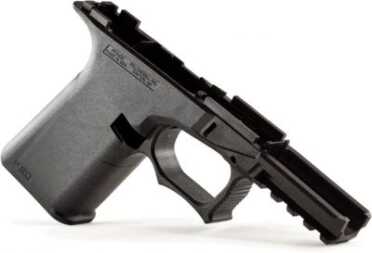Polymer80 is introducing two new 80 percent pistol frames for 2017. These uncompleted receivers are compatible with Glock 19 Gen 3 parts and aftermarket parts. They are also compatible with Glock 23 and Glock 32 components.
The idea behind these kits is for home gunsmiths to build their own Glock 19-pattern pistol without have to start from scratch. Because these aren’t firearms they don’t need to transfer through an FFL for shipping. That means these receivers can be shipped right to your door.

Shown here complete with aftermarket components. (Photo: Polymer80/Facebook)
The 80 percent market has been growing as fast as anything else in the world of firearms but this receiver represents a real milestone. Rifle kits make up the bulk of 80 percent receivers. Recently a few companies started to developed 80 percent handgun kits but the 1911 pattern dominates there.
Polymer80 put together a Glock 17-compatible kit not too long ago, and while the Glock 19-pattern kit was inevitable, it’s also a real breakthrough for 80 percent builders. This kit, the PF940Cv1, produces a real all-purpose handgun suitable for home defense, concealed carry and even competition shooting.
The PF940Cv1 comes in two versions, the Spectre textured frame kit and the smooth-surfaced Ready-Mod kit. The textured kit has a factory grip pattern molded into the frame where the Ready-Mod kit is featureless for users looking to develop their own grip pattern. Both have a $150 price tag.
See Also: 80 Percent Glock 17 Kits
Getting the chance to build your personal compact service pistol isn’t the only reason to want one of these kits. In addition to being able to cherry-pick every component from bottom to top, these frames have a lot of nice features. At the front of the frame they have a full-length hardened accessory rail. The rail conceals a small steel serialization plate. The grips are straight without any finger grooves. And the trigger guard is deeply undercut to prevent “Glock knuckle.”

The Ready-Mod stipple-ready grip frame. (Photo: The Glock Store)
Several companies including Brownells, the Glock Store, Rainier Arms and Tactical Shit are taking pre-orders now. Vendors expect to ship before March.
Each kit includes one frame, a machining jig, end mill, drill bits, a stainless steel locking block, a stainless steel rail block and a set of hardened steel frame pins. Users will need a trigger system, magazines, and the parts to build a slide assembly.
With the huge aftermarket for these pistols it’s entirely possible to build a PF940Cv1 frame without a single factory Glock part. Whether you’re searching for a gunsmithing project of intermediate difficulty or just looking to build the ultimate custom service pistol, this is one kit to be on the lookout for.

The plate is blank. You add a number if you wish to serialize your build.
The article states: “The rail conceals a small steel serialization plate.”. Huh? I thought one of the reasons people buy these 80% lowers is to prevent a possible traceback from the government to the owner. If the manufacturer keeps records of the purchaser and the associated serial number of the 80% lower that person purchased, well, it’s a simple matter of the government obtaining a subpoena to obtain that information. The concept of a ‘ghost gun’ goes out the window. I realize some people will purchase the 80% lower so they can build/customize the gun they want, however, I suspect others make purchases based on other criteria, like that mentioned above. What am I missing here? If someone could clear up my ignorance on this subject it would be appreciated.
What you’re missing is the Law.
IF you want to transfer it, you MUST mark it and do the proper background check and transfer papers to do so, just like any other gun.
Homemade guns are non-transferable under current federal law.
I found info that says otherwise…………………….
According to the Bureau of Alcohol, Tobacco and Firearms (BATF), an individual can sell or transfer a firearm to another person without record keeping as long as both individuals reside in the same state and the recipient is not someone who falls within the categories of prohibited persons (such as a convicted felon). There may be state or local regulations that otherwise impact the transaction, but as far as federal law is concerned, it is not necessary for the seller to be licensed, nor is the seller required to perform a background check of the buyer. There is no federal regulation that precludes a transaction involving a homemade firearm from being sold or transferred in a similar manner, as long as such a sale or transfer was not the original intent of the firearm’s maker.